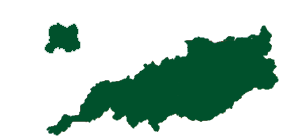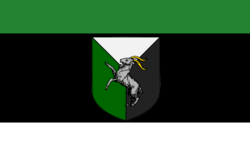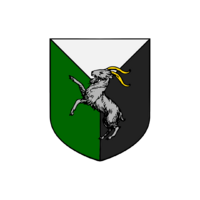Swinas: Difference between revisions
TentuberrAlt (talk | contribs) No edit summary |
No edit summary |
||
| Line 1: | Line 1: | ||
{{Infobox country | {{Infobox country | ||
| population = | | population = | ||
| conventional_long_name = | | conventional_long_name = Federal Republic of Swinas | ||
| native_name = | | native_name = Respublica foederalis Swinas | ||
| common_name = Swinas | | common_name = Swinas | ||
|image_flag = [[File:Kingdom of Swinas.png|250px]] | |image_flag = [[File:Kingdom of Swinas.png|250px]] | ||
Revision as of 15:57, 12 May 2024
Federal Republic of Swinas Respublica foederalis Swinas | |
|---|---|
 | |
| Capital | Cape Cresta City |
| National Language | German, Common |
| Ethnic groups |
|
| Demonym(s) | Swinnic |
| Government | Constitutional Monarchy |
• Monarch | King Friedrich III |
• Prime Minister | Eduard Hoffman |
| Area | |
• Total | 985,095 km2 (380,347 sq mi) |
| Population | |
• 2021 census | 42,299,153 |
| GDP (nominal) | estimate |
• Total | 448,984,350,000 |
| Currency | Swinnic Ram, Swinnic Buckling (SR, SB) |
| Driving side | right |
| Calling code | +59 |
Swinas, or, the Kingdom of Swinas is a constitutional monarchy composed of 7 autonomous districts. The capital of the Kingdom of Swinas is Cape Cresta City, where the nation was also founded under the "Duchy of Cresta" name. The nation is located in Hiraethia and is bordered by Vultesia, Wellsenfaille, and the Eldmoran Empire. The Kingdom of Swinas is a member of the Vedoti Pact and shares good relations with the Hylian Republic. The population of the Kingdom of Swinas is 42,299,153 according to a census conducted 2 years ago.
Etymology
Though the exact Etymology of Swinas is unknown, many speculate it to be related to the German word "Schwine", which means Pig.
History
The Kingdom of Swinas was officially established in 1276 AD, but the history of the territories inside of Swinas date far back. We begin with the Yetubans, who founded an empire spanning through much of Northern Swinas. Their ethnic origin appears to be Nordinselli, but shared Swinnic Culture influence due to the areas they conquered. After a series of conflicts against the native tribal nations against the Yetubans, they would retreat to the North-East of Swinas, but leaving behind remnants of their culture.
One of these remnants was a city state know at the time as Kirchena. Kirchena was a mainly Swinnic City-State, but inherited some of the Nordinselli Culture left behind by the Yetuban Empire. Kirchena originally inherited a more Feudal Hierarchy of Government and Civilization, and would have 7 Kings. The first King, who was also the founder of Kirchena, was
Military
The Swinnic Military has been an integral part of the nation since the Duchy of Cresta's inception. Today, the Swinnic Military has 3 branches; the Swinnic Ground Forces, the Swinnic Air Force, the Swinnic Navy. Each branch usually has sub-divisions within it, such as the Swinnic Air Force, which has a Bomber, Close Air Support, Para-Trooper, and Fighter sub-division. The Swinnic Ground Forces include an Artillery, Tank, Anti-Air, and Infantry sub-division. The Swinnic Navy includes the Coast Guard, Naval Air, and Marine sub-division. The main Swinnic Navy is what you would expect from a navy. The Swinnic Military also contains a special forces division, the Spezialeinheiten.
Politics
The politics of the Kingdom of Swinas is largely defined by two major political parties; them being the Swinnic Liberal Movement, and the Swinnic Nationalist Movement, each with their own goals and visions of how the country should operate. The Swinnic Liberal Movement is a movement based on the idea of Liberalism, whereas the Swinnic Nationalist Movement has a more nationalist and conservative outlook on Swinas.
Economy
Gold was the common currency in Swinas until 1788, when the absolute monarchy system would be abolished, and many would call for further modernization. So, the first Prime Minister of Swinas would call for the creation of an official common currency. The Swinnic Ram would be created as the paper currency of Swinas, and the Swinnic Buckling would be the metal currency of Swinas. Both were backed by gold.
Geography
Swinas contains 2 major rivers, them being the Dandora and the Kishwara. The Dandora is located in the north of Swinas and borders the Talsar Sea. The Kishwara, meanwhile, would be located at the West of Swinas, bordering the Parthenean Coast. These two rivers would be where the Duchy of Cresta (which would go on to unify Swinas), and the Duchy of Wheaton would be founded.

